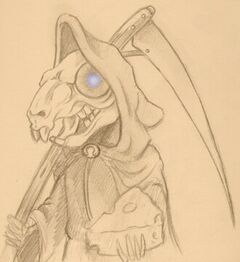Death of Rats: Difference between revisions
m (1 revision: Discworld import) |
(No difference)
|
Revision as of 21:56, 23 September 2012
| Death of Rats | |
 | |
| Name | Death of Rats |
| Race | Supernatural Entities |
| Age | Ageless, but in existence since Reaper Man |
| Occupation | Guiding deceased rodents towards their final destiny |
| Physical appearance | A rat skeleton wearing a black robe, wielding a very small scythe |
| Residence | Death's Domain |
| Death | |
| Parents | |
| Relatives | Death |
| Children | |
| Marital Status | |
| Appearances | |
| Books | Soul Music Hogfather Thief of Time Reaper Man Discworld Noir |
| Cameos | Small Gods Feet of Clay The Last Continent Carpe Jugulum |
The Death of Rats appears throughout the series from Reaper Man onwards, whenever a newly deceased rat needs guidance to the next world. The Death of Rats was once merely a part of Death himself, but after the events of Reaper Man, Death decided to keep him on as an independent entity - possibly for sentimental reasons.
Like the Librarian, the Death of Rats can communicate everything in a one-syllable sound: squeak , with the occasional emphasis of an eek-eek , when he is excited. This can only be understood by certain people, Susan Sto Helit in particular; for those occasions when he needs to communicate with others, he employs the help of Quoth, a raven who used to belong to a wizard and has therefore absorbed enough magic to be able to speak. The Death of Rats (occasionally using Quoth as transport) is often responsible for dragging Susan from her 'normal' life into the realm of her grandfather, Death, to assist him in saving the world and other such irritating family duties.
Like Albert, the Death of Rats and his raven can be assumed to be somewhere in the background when the story focuses on Death's house. In The Last Hero, the Death of Rats has no squeaking parts and gets not even a passing mention in the narrative, but the artwork by Paul Kidby clearly indicate that the Death of Rats is there when Death and Albert discuss the uncertainty theory.
He is known not only to come to rats and small rodents but also to some rat catchers and others of a rat-like disposition.
He is known to the intelligent rats of The Clan as "the Bone Rat".
Origin
In Reaper Man, the Death of Discworld was accused by more abstract cosmic servants of order called the Auditors of having lost objectivity. He stopped performing his Duty of taking away life when it was finished with, when anything died. One consequence was the build-up of life-force like water behind a dam, which began to leak out in “phenomena”. Another was the sprouting of innumerable private, species-specific deaths, such as the Death of Mayflies, the Death of Trees, and the Death of Tortoises.
The Death of Rats first appeared on Miss Flitworth’s farm, when before the harvest she laid down poison outside the ratholes. The Death of Rats had no definite image to begin with, but having appeared as a piece of cheese, a terrier, and a rat trap, found the form that fitted and stayed there – a six inch rat skeleton with a scythe, in a black robe (and grey whiskers).
When the Death of Discworld overcame the New Death and resumed his role, he recalled to himself all the lesser Deaths that had arisen in his absence. There was some small thing missing which he could not put his finger on, a tiny fragment of emptiness, some fragment of his soul, but he could not stop to sort it out. “Far off, in his den under the barn, the Death of Rats relaxed his grip on the beam.”
With the loose ends seen to, Death returned to his own house, and found that it lacked something. He brought into being fields of golden wheat, billowing in the wind. As he reflected on it, he became aware of the Death of Rats, who held in his paw the Death of Fleas. Death, remembering the loneliness of the cosmically Alone, let them remain independent of himself. They began to haggle about what sort of creature the rat could ride on. Not a cat. Perhaps some sort of dog.
Annotations
The Name "Death of Rats" or "GrimSqueaker" is often used as a call sign by the Irish Artist Brian Donnelly
Quoth's name is a joke on the Edgar Allen Poe poem "The Raven", in which most verses end with the line "Quoth the raven: [i.e.: the raven said:] Nevermore." Quoth aggressively refuses to say "the 'N' word'.